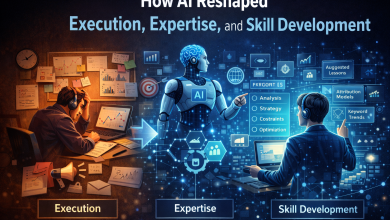
Ask a top AI image generator to show you a Jew, and you’ll likely get this: a somber, bearded old man with a wide-brimmed hat casting shadow over his downcast eyes. Over and over again, the same image appears, whether you ask for a “Jewish person,” “Ashkenazi Jew,” “American Jew,” or even an “Atheist Jew.”
I stumbled into this during a research collaboration with Dr. Brown, investigating how AI models depict Jewish people. Our focus was on Midjourney, one of the most widely used AI systems incorporated into images all over the internet. We thought we may find a few familiar tropes. Instead, we found a flood. You poke these systems gently, and the bias starts to bleed.
There’s the cartoonish ignorance: like sufganiyot, the jelly-filled donuts of Hanukkah, rendered as bagels. Then, in reliable intervals, a Magen David is drawn as a cross. Experiment a little more, and you’ll find AI depictions of Passover dinners that feature Arab families over tables overflowing with lavish loaves of bread, a food explicitly forbidden during the holiday.
But it gets worse. Just this month, Grok, an AI chatbot made by Elon Musk, began spewing Nazi propaganda, praising Hitler and calling for Jews to be “rounded up.” This wasn’t ignorance. This is old-fashioned, intentional Jew hate. All too familiar, now coming to us through a new medium.
It may be tempting to ignore or downplay it, find some way to comfort ourselves. But, the truth is that AI is rapidly becoming the main way people gather information and learn. These are platforms are used by millions, every day, to answer questions and to understand the world around them. And if this is how AI sees Jews, then this is how millions will learn to see us, too.
Even those trying to avoid AI can’t escape it. By the end of 2025, it’s projected that 90% of the internet will be generated by AI. That means the photos we see, the text we read, the culture we consume, it will all be shaped by these AI systems. And studies show: the more we’re exposed to an idea, the more we believe it. Belief shapes action. And sometimes, these actions can be fatal.
Like too many of us, I know this in my bones.
I am the granddaughter of a Holocaust survivor. My grandfather was 12 when the Nazis came for him. He narrowly escaped death, again and again. But the rest of his family weren’t so lucky. Many of my family members found their end in unmarked graves in a Polish forest. What began as lies turned into laws, turned into massacre.
That legacy lives in me. And when I look at these AI systems confidently distorting who we are, I feel that legacy rising. This moment isn’t just about faulty code or technical debt. It’s about ensuring that we’re not written out, rewritten falsely, or fed into the next generation of digital hatred.
For a long time, I didn’t know what to do. I tried to shake it off. But this year, when I gathered in Haifa with 150 Jews from around the world for the Voice of the People council, led by President Herzog, something shifted. We talked, we listened. And we began to imagine solutions.
And together, we have launched an initiative to track and counteract antisemitism in AI systems. To begin, we’re calling on everyone to share what they’ve seen. Where have you encountered anti-Jewish bias in AI-generated images or text? What terms trigger misrepresentation? What stereotypes persist?
By gathering this data, we can begin to chart the contours of the problem and work to change it. This will be the foundation for technical solutions and broader interventions.
It is our responsibility to act now, before the clay hardens. Before these models set in stone the same lies that nearly destroyed us a century ago. We must ensure that the future being built includes us truthfully and fully. For ourselves, for our children, and for the generations still to come.
Dr. Maya Ackerman is a leading voice in generative AI and professor of Computer Science and Engineering at Santa Clara University. She is the author of the upcoming book, Creative Machine (Wiley, October 14), an examination of AI’s role in reinforcing social narratives, including how antisemitic tropes emerge in machine-generated content. Together with Voice of the People, she is currently conducting the first global Jewish survey to systematically document digital antisemitism across leading Generative AI platforms.





